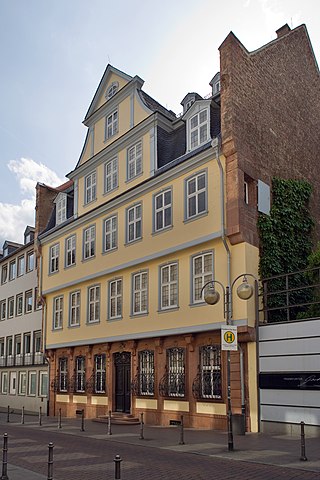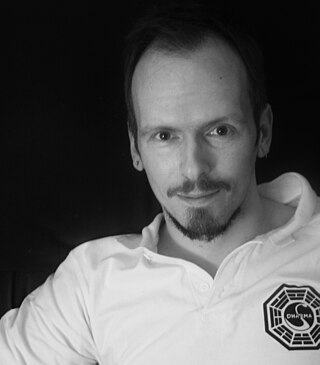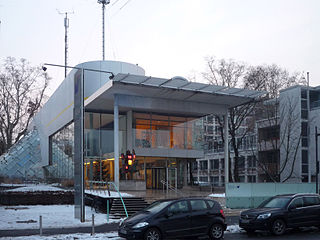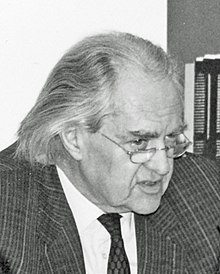
The Städel, officially the Städelsches Kunstinstitut und Städtische Galerie, is an art museum in Frankfurt, with one of the most important collections in Germany. The Städel Museum owns 3,100 paintings, 660 sculptures, more than 4,600 photographs and more than 100,000 drawings and prints. It has around 7,000 m2 (75,000 sq ft) of display and a library of 115,000 books.

The Goethe House is a writer's house museum located in the Innenstadt district of Frankfurt, Germany. It is the birthplace and childhood home of German poet and playwright Johann Wolfgang von Goethe. It is also the place where Goethe wrote his famous works Götz von Berlichingen,The Sorrows of Young Werther, and the first drafts of Urfaust. The house has mostly been operated as a museum since its 1863 purchase by the Freies Deutsches Hochstift, displaying period furniture and paintings from Goethe's time in the house.
Museumsufer is the name of a landscape of museums in Frankfurt, Hesse, Germany, lined up on both banks of the river Main or in close vicinity. The centre is the historic art museum Städel. The other museums were added, partly by transforming historic villas, partly by building new museums, in the 1980s by cultural politician Hilmar Hoffmann. The exhibition hall Portikus was opened on an island at the Alte Brücke in 2006.
Gerhard Scherhorn was a German Professor and economist.

Dietmar Dath is a German author, journalist and translator.

The Museum für Moderne Kunst, or short MMK, in Frankfurt, was founded in 1981 and opened to the public 6 June 1991. The museum was designed by the Viennese architect Hans Hollein. Because of its triangular shape, it is popularly called "piece of cake". Since 2018, Susanne Pfeffer has been director of the MMK.

The Museum of World Cultures is an ethnological museum in Frankfurt, Germany. Until 2001 it was called the Museum of Ethnology.

The Jewish Museum Frankfurt am Main is the oldest independent Jewish Museum in Germany. It was opened by Federal Chancellor Helmut Kohl on 9 November 1988, the 50th anniversary of Kristallnacht.

The Liebieghaus is a late 19th-century villa in Frankfurt, Germany. It contains a sculpture museum, the Städtische Galerie Liebieghaus, which is part of the Museumsufer on the Sachsenhausen bank of the River Main. Max Hollein was the director from January 2006 to 2016, followed by Philipp Demandt.
Hermann Karl Lenz was a German writer of poetry, stories, and novels. A major part of his work is a series of nine semi-autobiographical novels centring on his alter ego "Eugen Rapp", a cycle that is also known as the Schwäbische Chronik.

The Museum für Kommunikation (MfK) is a museum of the history of communication in Frankfurt, Germany. It opened on 31 January 1958 under the name Bundespostmuseum and is on Frankfurt's Museumsufer.

F. W. Bernstein was a German poet, cartoonist, satirist, and academic. He worked for the satirical biweekly pardon. After teaching at schools, he was professor of caricature and comics at the Berlin Academy of the Arts from 1984 to 1999. He was one of the founding members of the Neue Frankfurter Schule, which published the satirical magazine Titanic.

Mayer Carl Freiherr von Rothschild was a German Jewish banker and politician, as well as scion of the Rothschild family.

Lothar Zenetti was a German Catholic theologian, priest, and author of books and poetry. In Frankfurt, he was both a minister for young people and a parish priest. He was also active on radio and television. His songs, for example the popular "Das Weizenkorn muss sterben" and "Segne dieses Kind", appear in both Protestant and Catholic hymnals.

Städtische Bühnen Frankfurt is the municipal theatre company of Frankfurt, the largest city of Hesse Germany. The name dates back to 1919. The company is structured today in two organisations, Oper Frankfurt for opera, and Schauspiel Frankfurt for drama (Schauspiel).

Rolf Dieter Lauter is a German art historian, curator and art advisor.

Peter Iden is a German theater critic and art critic.
Günther Rühle was a German theatre critic, book author and theatre manager. He directed the feuilleton (editorial/entertainment) sections of major newspapers and was regarded as an influential theatre critic, beginning in the 1960s. He managed the Schauspiel Frankfurt from 1985 to 1990. Rühle was a member of the PEN-Zentrum Deutschland. From 1993 to 1999, he was president of the Deutsche Akademie der Darstellenden Künste in Frankfurt. He published books about the history of theatre in Germany, and its criticism.
Liliane Weissberg is an American literary scholar and cultural historian specializing in German-Jewish studies and German and American literature. She is currently the Christopher H. Browne Distinguished Professor in Arts and Sciences and Professor of German and Comparative Literature at the University of Pennsylvania. She received, among others, a Guggenheim Fellowship, the Humboldt Research Award for her research on German-Jewish literature and culture and the Berlin Prize of the American Academy in Berlin, and holds an honorary degree from the University of Graz.
Detlef Hoffmann was a German art historian.














